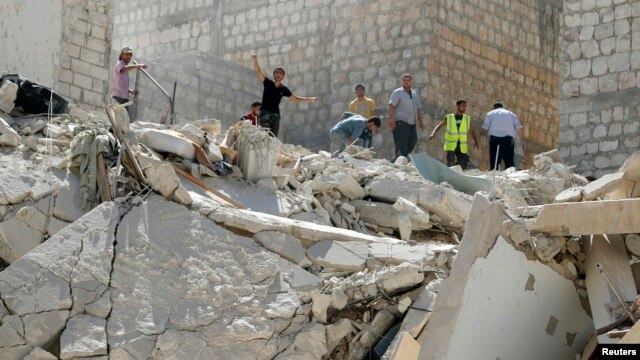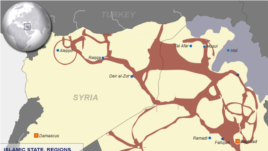In Major Assault, IS Fighters Seize Kurdish Villages in Syria
A man gestures as residents look for survivors under the rubble of collapsed buildings after what activists said was a vacuum bomb was dropped by forces of Syria's President Bashar al-Assad on Maarat Al-Nouman, south of Idlib, Sept. 18, 2014.
Last updated on: September 18, 2014 2:44 PM
Islamic State fighters backed by tanks have captured during the past 24 hours, 16 Kurdish villages in Northern Iraq near the Turkish border.
According to British-based Syria Observatory for Human Rights, the militant extremists have made territorial gains in Syria's northern Kurdish region of Kobani, also known as Ayn Arab.
“This is a very important advance for them,” Rami Abdulrahman, the Observatory's founder, told Reuters.
The aid organization said Kurdish civilians were fleeing their villages in fear of being massacred by the advancing militants.
Nawaf Khalil, a spokesman for Syria's powerful Kurdish Democracy Democratic Union Party, said the Kurdish fighters withdrew or lost up to 20 villages in the Kobani region and evacuated civilians there.
Nawaf Khalil, a spokesman for Syria's powerful Kurdish Democracy Democratic Union Party, said the Kurdish fighters withdrew or lost up to 20 villages in the Kobani region and evacuated civilians there.
“We've lost touch with many of the residents living in the villages that ISIS [Islamic State] seized,” Ocalan Iso, deputy head of the Kurdish forces in Kobani, told Reuters via Skype.
In an interview with VOA's Kurdish service, Kobani Canton region premier Anwer Moslem also expressed his fears about the situation.
In an interview with VOA's Kurdish service, Kobani Canton region premier Anwer Moslem also expressed his fears about the situation.
"ISIL are attacking with American tanks and heavy weapons that they captured in Mosul. They are attacking Kobani and want to control it and carry out a massacre there just like what happened [to Yezidis] in Sinjar where people had to leave their homes, where people were killed, women were abducted, children were killed," he said.
Moslem told VOA Western countries should have a sense of urgency in stopping the Islamic State group’s militants.
"President Obama said the ISIL will be attacked but nothing has been done yet," he said. "We are hopeful that world powers especially America, Russia, France, and Britain would take some practical steps against ISIL [in Syria] and support the people of Kobani."
"President Obama said the ISIL will be attacked but nothing has been done yet," he said. "We are hopeful that world powers especially America, Russia, France, and Britain would take some practical steps against ISIL [in Syria] and support the people of Kobani."
The Kurds were appealing for military aid from other Kurdish groups in the region including the Kurdistan Workers' Party (PKK), he said. Support from Kurdish fighters who crossed from Turkey helped to repel an attack by Islamic State fighters on Kobani in July.
Tanks, rockets, artillery
Redur Xelil, spokesman for the main armed Kurdish group in Syria, the YPG, said Islamic State fighters had encircled Kobani.
The group was using tanks, rockets and artillery in the attack. “We call on world powers to move to halt this barbaric assault by ISIS,” he told Reuters via Skype.
The YPG, which says it has 50,000 fighters, said it should be a natural partner in a coalition the United States is trying to assemble to fight Islamic State militants.
But the Syrian Kurds' relationship with the West is complicated by their ties to the PKK - a group listed as a terrorist organization in many Western states because of the militant campaign it waged for Kurdish rights in Turkey.
Obama's plans to expand support for groups fighting Islamic State militants in Syria have focused on Sunni Muslim insurgents deemed moderate by Washington.
But there have been new signs of cooperation between the YPG and such groups in Aleppo province: they recently set up a joint operations room to direct the fight against Islamic State militants in that area.
The fighting around Kobani is part of the Islamic State's wider battle in Syria as the extremists look to seize control of the few areas in the northeast still outside of their control.
The Syrian government, meanwhile has begun targeting the group with greater frequency since the militants overran much of northern and western Iraq. Before that, President Bashar al-Assad's regime had largely left the group alone, instead focusing his firepower on more moderate rebel brigades.
Surveillance flights
Surveillance flights
With the United States planning to expand military action against Islamic State fighters from Iraq to Syria, a surveillance drone was spotted for the first time over nearby Islamic State-controlled territory in Aleppo province, the Syrian Observatory for Human Rights, which tracks Syria's civil war, said.
It was not immediately clear who was operating the drone.
U.S. President Barack Obama last week said he would not hesitate to strike the radical Islamist group that has used Syria as a base to advance its plan to reshape the Middle East according to its radical vision of Sunni Islam.
The United States is conducting airstrikes against Islamic State militants in Iraq and last month Obama authorized surveillance flights over Syria.
Kokab Farshori contributed to this report from VOA's Kurdish service, some material for this report provided by Reuters. VOA
Kokab Farshori contributed to this report from VOA's Kurdish service, some material for this report provided by Reuters. VOA



No comments:
Post a Comment